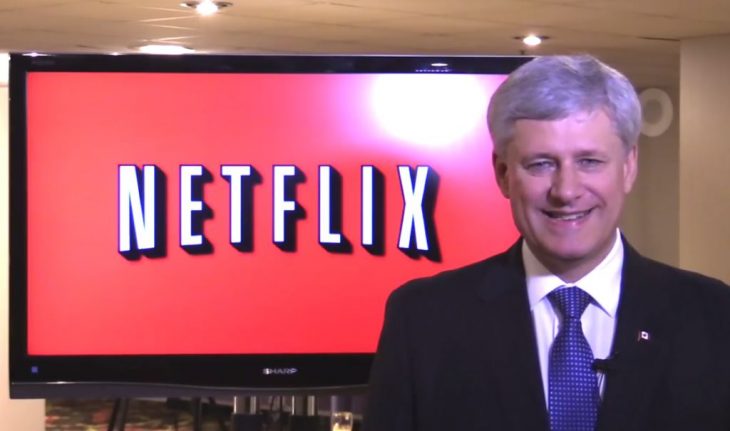
“WHY IS OUR PM SHILLING for Netflix during the first week of our federal election campaign?” I wondered when I saw this video of Prime Minister Stephen Harper.
We learned in the video tweeted early yesterday evening that one of his all-time favourite TV shows is Breaking Bad, reminding us it “is even available on some online streaming services, if you’ve never seen it.” Well, it’s only available for streaming online from Netflix (not some), unless you want to purchase individual episodes for download from Google Play or iTunes.
Oh, it’s also available on demand from our cable and IPTV companies too, but hey, who cares about them, right? They only employ tens of thousands of Canadians, pay millions in taxes and contribute to thousands of hours of Canadian content, which means more jobs and taxes and so on. But sure. Netflix.
Why make a company which many estimates say has between 3.5-to-4 million subscribers here (and is growing apace), meaning it earns something like $400 million a year in Canada and yet leaves almost none of it here, pays no taxes and employs no Canadians at all, a top priority in our election campaign?
It stunned me – as did the boring, stilted (some on Twitter also said “creepy”) video itself. You’d think someone with a background in television, such as the Conservative Party’s spokesman Kory Teneyke, would be able to come up with a far better clip – maybe with some deft humour or something a little cooler than the PM talking earnestly beside a giant Netflix logo?
Then again, Teneyke ran the mostly undeft, uncool, humourless, now-deceased, Sun News, so perhaps this lame video shouldn’t be surprising.
“Some politicians want to tax digital streaming services like Netflix and YouTube. Some have even called on us to introduce a Netflix tax,” said Harper in the video. I wondered, “are politicians calling for this? Has NDP Leader Tom Mulcair asked for it? How about Liberal leader Justin Trudeau?”
We fished around the web for hours last night and found nothing (neither the NDP nor the Liberal Party websites have anything to say about digital media or taxing Netflix and YouTube, as the PM claims, nor are there stories linking Mulcair or Trudeau to such an idea). With the first leaders debate tonight hosted by Rogers at 8 p.m. online and on TV (Maclean’s, Citytv, OMNI and CPAC), I bet this will come up! Interesting to note that Rogers is a co-owner of a Canadian Netflix competitor in shomi – and I wonder if the PM watches anything on shomi, or CraveTV? He didn’t say in his video.
"It’s unbecoming for our PM, who so often reminds us how good he and his ruling party are for the economy, to resort to being the pitchman-in-chief for a company which contributes nothing to it."
What underlies all this is that less than a year ago, Ontario’s Liberal government (in the form of the assistant deputy minister of tourism, culture and sport) came to the CRTC’s Talk TV hearing and asked that online video distributors be subject to the same financial contributions to Canadian content which our traditional TV providers are. That, of course, led to some of the most overt political interference into an ongoing CRTC proceeding we’ve ever seen.
As well, with Ontario premier Kathleen Wynne using the past few days to urge Canadians to turf Harper, this re-hashing of that Ontario Liberal government idea can’t be dismissed by the feds.
Then, shifting over to the Conservative Party web site, a release posted there yesterday says: “Both the NDP and the Liberals have called on Netflix to provide ‘detailed information about their services, such as consumers’ habits’ and more ‘data on over-the-top services, with a particular focus on consumer habits’.” Now, it’s unclear if that release is quoting the NDP or Liberals, or the PM himself.
More likely, it originated from requests by Liberal and NDP members of the Standing Committee on Canadian Heritage for the ministry or the CRTC to collect such data from over-the-top video providers – something Netflix steadfastly and famously refused to provide.
So, is this worth a conversation? Definitely. New digital solutions are greatly disrupting long-standing, regulated businesses around the world (see, Uber, AirBnB, etc.) affecting jobs and altering lives for good and bad. Our leaders should be having these conversations. The issues are very important and shouldn’t just be reduced to a simple slogan like “No Netflix Tax”.
It’s also unbecoming for our Prime Minister, who so often reminds us how good he and his ruling party are for the economy, to resort to being the pitchman-in-chief for a company which contributes nothing to it.


